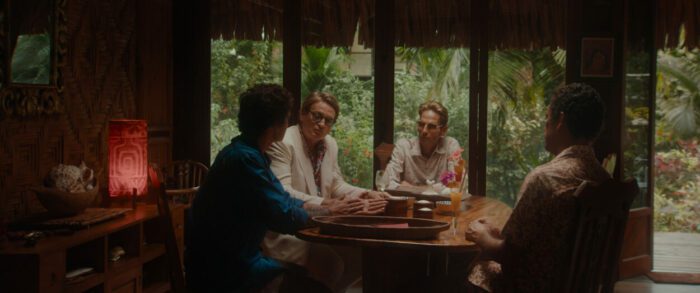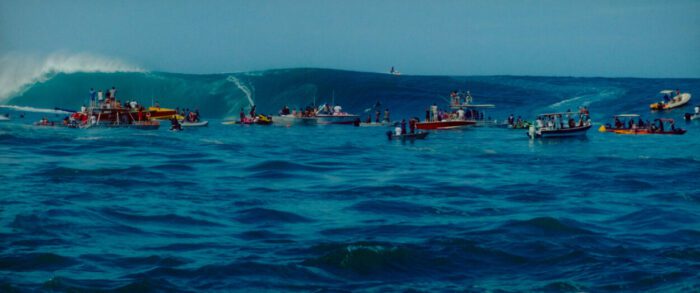“I don’t have any solid information,” says the man in the white sport coat and tinted glasses. “I have no certainty.” And neither, for most of the languid 145-minute runtime of Albert Serra’s experimental geopolitical thriller, will you. But patience rewards: Pacifiction is an expertly crafted, sumptuously shot, and surprisingly improvised arthouse film that will immerse you in the tropical milieu of its Tahiti setting while engaging you in a political mystery reminiscent of 1970s conspiracy-paranoia thrillers.
De Roller, played by Benoît Magimel (long ago the student of Isabelle Huppert in The Piano Teacher), is that man who lacks certainty. By official title, he is known as the High Commissioner of the Republic of Tahiti. His duties seem amorphous and endless, his role nearly without boundaries. He navigates the complex politics of the island’s established offices as deftly as he sorts out backroom deals at shady clubs where the locals mingle in various states of undress and arousal. Always calm, always collected, always the paragon of diplomacy, De Roller spends his days negotiating deals, stamping out fires, and surveying the activities on and off the island he has come to feel is “his own”—although we and the natives know it is not.

De Roller’s omnipresent white sport coat, tinted shades, and tropical shirt distinguish him from the natives, as do his unfailingly perfect social manners. No matter the situation, whether strong-arming a local priest, welcoming a visiting dignitary, or tamping down prospects of a potentially-violent political protest, his carefully pointed questions elicit the information he seeks, the resolutions he desires, while giving away nothing. His is clearly an approach that has served him well enough in his office even as Tahiti—the jewel of French Polynesia—warily regards the French.
As well they should, given their shared history. From 1966 to 1974, France detonated over 40 nuclear weapons in French Polynesia. For decades, the French government claimed that the testing was done safely. But in 2013, a trove of declassified documents suggested otherwise, and a recent meta-analysis of them suggests the tests exposed 90% of the 125,000 people living in French Polynesia to radioactive fallout. So there is ample reason for distrust.
De Roller is not only the film’s main character; he serves also as its point of view. Like Jack Nicholson’s Jake in Chinatown, he’s in every scene, nearly every shot. We know what he knows, and no more, as we follow him from one sleazy joint to another, one oblique confrontation to the next. When a French admiral (Marc Susini) shows up on the island, the rumor mill heats up. De Roller becomes our investigator, as local girls are shipped to and from a mysterious offshore destination. He espies what seems like the sail of a submarine popping out from the deep waters of the Pacific.

Are the French resuming their testing of nuclear weapons off the Tahitian coast?
That’s the big question, and as the locals jockey for position under De Roller’s influence, he’s on a mission to learn the truth, one his own superiors are hiding from him. One ally might be Shannah, an employee at the local hotel jockeying for better position and better life. She presents as a female and is played by Pahoa Mahagafanau, a trans Polynesian māhū (one born male who presents, and is accepted as, female). She too has her own ambitions and is De Roller’s equal when it comes to caginess.

The plot of Pacifiction plot may sound like that made for a rousing conspiracy thriller with supremely high stakes. But the film does not quite “work” like The Parallax View or Three Days of the Condor. There are no action-movie tropes—no chases, no torture scenes, no confessions, abductions, fistfights, or gunplay—just instead the languorous, sometimes nearly torporific island rhythms ebbing and flowing slowly along as De Roller’s investigation takes him through Tahiti’s immersive, impressive land- and sea-scape of tropical fauna, high-wave surfing, and seedy nightclubs.

In that, Pacifiction‘s pace is closer to that of Jeanne Dielman than Jason Bourne. I’d almost say its narrative resembles a kind of first-person exploratory gameplay, where your protagonist wanders about stumbling into vaguely ambiguous conversations with an assortment of increasingly curious randos, hoping to learn the big secret and confront the big boss. But that comparison does Pacifiction‘s elegant art a grievous misjustice. Serra’s film is an arthouse experiment, the kind that immerses the viewer in a purely cinematic experience.
Part of Pacifiction‘s enigmatic appeal lies in its unusual construction. Serra cites the memoirs of Tarita Tériipaia (who was for a decade or so married to Marlon Brando) as one inspiration for a screenplay that formed the basis for Pacifiction, even if it wasn’t filmed as first written. Instead, its narrative is loosely improvised as its cast did not even see the script before filming! Magimel in particular was fed ad hoc dialogue by Baptiste Pinteaux (credited for “Collaboration on Dialogues”) via an unseen earpiece, his words and actions captured via three carefully positioned and intentionally discreet Black Magic Pocket Cinema cameras running simultaneously.
That unique method accounts for the unique pacing and languid rhythm of Pacifiction, a film whose narrative unfolds obliquely as its detective-protagonist learns a little more—and sometimes, a little less—with each cagey conversation. So, settle in. Do not expect the fast pace of a Mission Impossible installment (or the quirky-quick Full Time). And instead, wallow in the mysteries of an island once and perhaps again subjected to nuclear explosion and experimentation. Serra’s film is a pleasure: it may be difficult to describe, but it’s wholly, rapturously, incredibly immersive to watch.
Grasshopper Film and Gratitude Films presents Pacifiction, written and directed by Albert Serra, opening in Chicago February 17 at the Gene Siskel Film Center and at other cinematheques across the U.S. to follow. In French, with English subtitles.




